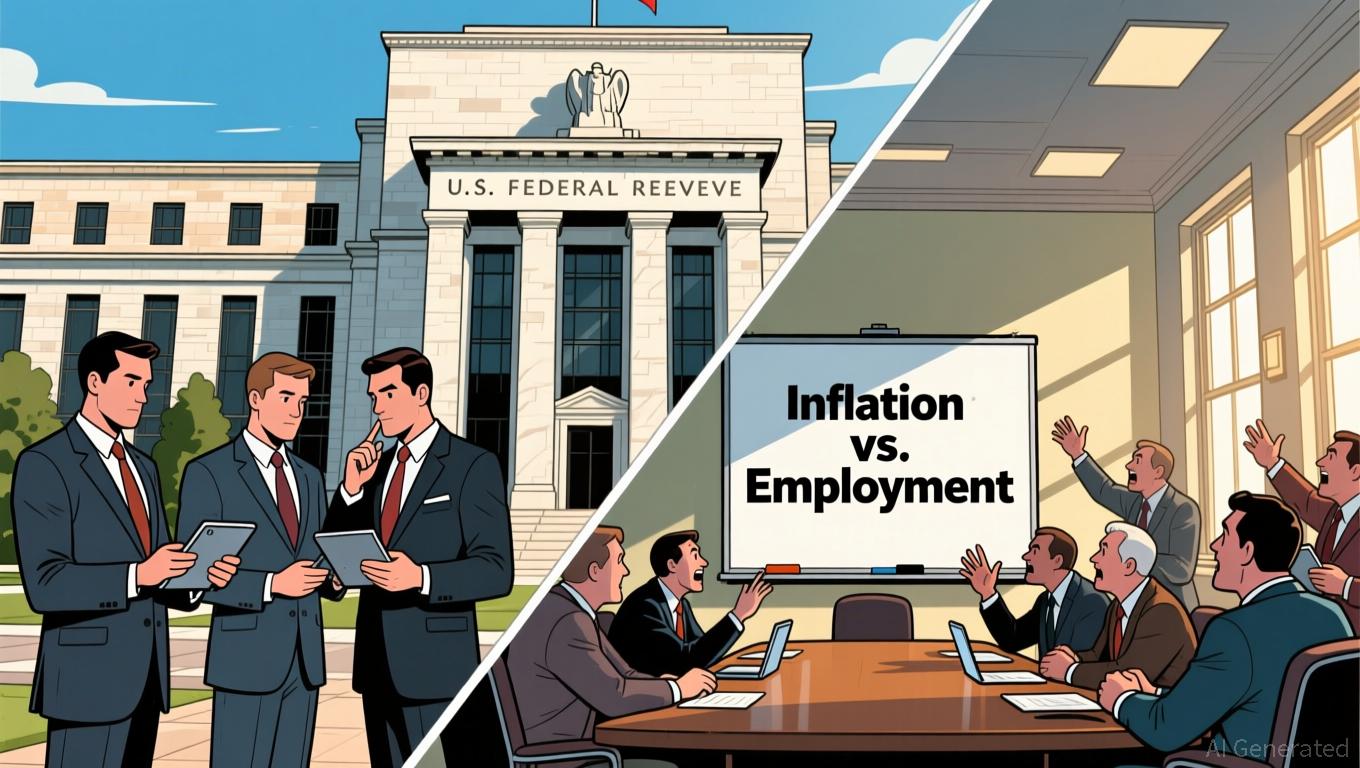Fed Faces a Test of Trust: Managing Divided Rate Views and Ethical Controversies
- Fed's October rate cut revealed 10-2 policy split, balancing inflation risks against labor market weakness amid 2%+ inflation. - Ethics scandal emerged over Kugler's stock trades during blackout periods, triggering IG investigation and accountability concerns. - Political tensions intensified as Kugler's resignation accelerated Trump-aligned Miran's board seat, complicating policy governance. - December meeting faces uncertainty: some advocate 25-basis-point cut for labor support, while others warn again
The Federal Reserve's latest policy discussions have brought to light growing disagreements within the institution regarding the direction of interest rates. The central bank's decision in October to lower rates by 25 basis points exposed sharp contrasts among officials, with some prioritizing inflation risks and others more concerned about a weakening job market. The minutes from the October 28-29 gathering, made public on November 19,
Adding to these difficulties is a blow to confidence in the Fed’s ethical standards, after it emerged that former Governor Adriana Kugler breached the central bank’s trading regulations. Kugler, who stepped down suddenly in August to allow Trump supporter Stephen Miran to join the Board,
The incident has fueled demands for change. Senator Elizabeth Warren, a persistent advocate for greater Fed transparency, renewed her call for bipartisan measures to tighten ethics rules, while Senate Banking Committee Chair Tim Scott stated that the episode "demonstrates that the Fed still lacks the safeguards or culture of responsibility the public expects"
Looking forward, the Fed’s December meeting remains in the spotlight. Some members, such as Governor Christopher Waller, believe another 25-basis-point cut is necessary to shield the labor market from further decline,

As the Fed steers through these complicated circumstances, its reputation faces two major tests: keeping inflation in check and rebuilding public confidence in its ethical practices. With internal rifts exposed and external oversight increasing, the central bank’s upcoming actions will be judged not only for their economic consequences but also for their effectiveness in upholding the institution’s credibility.
Disclaimer: The content of this article solely reflects the author's opinion and does not represent the platform in any capacity. This article is not intended to serve as a reference for making investment decisions.
You may also like
Adversaries Reportedly Received Voting Rights in Crypto Company Supported by Trump
- U.S. Senators Warren and Reed demand federal investigation into Trump-linked crypto firm WLF over alleged sales to sanctioned entities including North Korea, Russia, and Iran. - WLF denies claims, asserting "rigorous AML/KYC checks," but faces scrutiny for granting adversaries voting rights over its governance and Trump family's $3B stake in tokens. - Critics highlight conflicts of interest as Trump family members lead WLF while prioritizing token sales over compliance, alongside expansion plans involvin

XRP News Today: XRP Price Showdown: Downward Pressure Faces Off Against Institutional Confidence
- XRP faces a 25% price drop to $1.55 as technical breakdowns and weak sentiment indicators signal bearish momentum. - Analysts highlight conflicting forecasts: short-term bearish patterns vs. long-term institutional optimism driven by Ripple's regulatory progress and ODL adoption. - Derivatives market weakness (futures open interest down 62%) contrasts with strategic gains like SEC lawsuit resolution and cross-border payment utility expansion. - Key battlegrounds at $2.00 and $1.50 will determine whether

DOJ Intensifies Actions Against Crypto Tools Emphasizing Privacy
- William Hill and Keonne Rodriguez received 4-5 year prison sentences for operating Samourai Wallet, a Bitcoin mixer that processed $237M in criminal proceeds. - The case reflects intensified U.S. efforts to prosecute privacy-focused crypto tools, with prosecutors labeling mixing technology as "money laundering for Bitcoin." - Developers actively marketed the service to criminal users on darknet forums, acknowledging its core purpose was obscuring illegal transaction trails. - The conviction sparks debate

Bitcoin News Update: New Hampshire Introduces Bitcoin-Backed Bond in a Bid to Pioneer Digital Finance
- New Hampshire becomes first U.S. state to approve $100M Bitcoin-backed municipal bond, enabling private borrowing against over-collateralized crypto. - Bond structure includes 160% Bitcoin collateral and liquidation triggers if crypto drops below 130% of bond value, ensuring investor protection amid price volatility. - Proceeds fund state's Bitcoin Economic Development Fund, with Governor Kelly Ayotte calling it a "historic" step to position New Hampshire as digital finance leader. - Initiative bridges t
